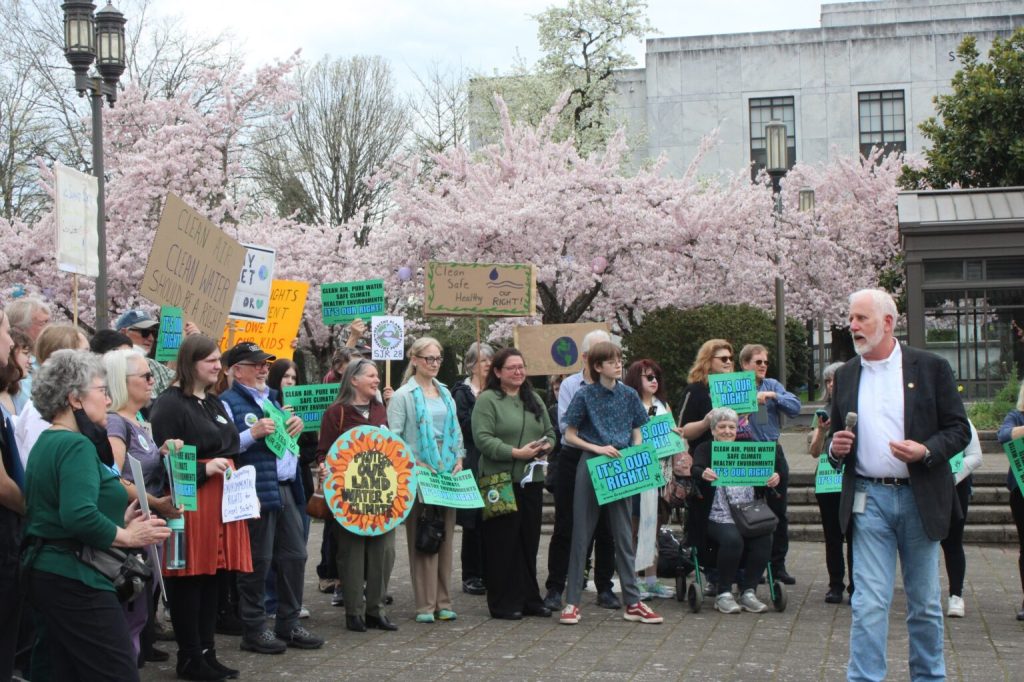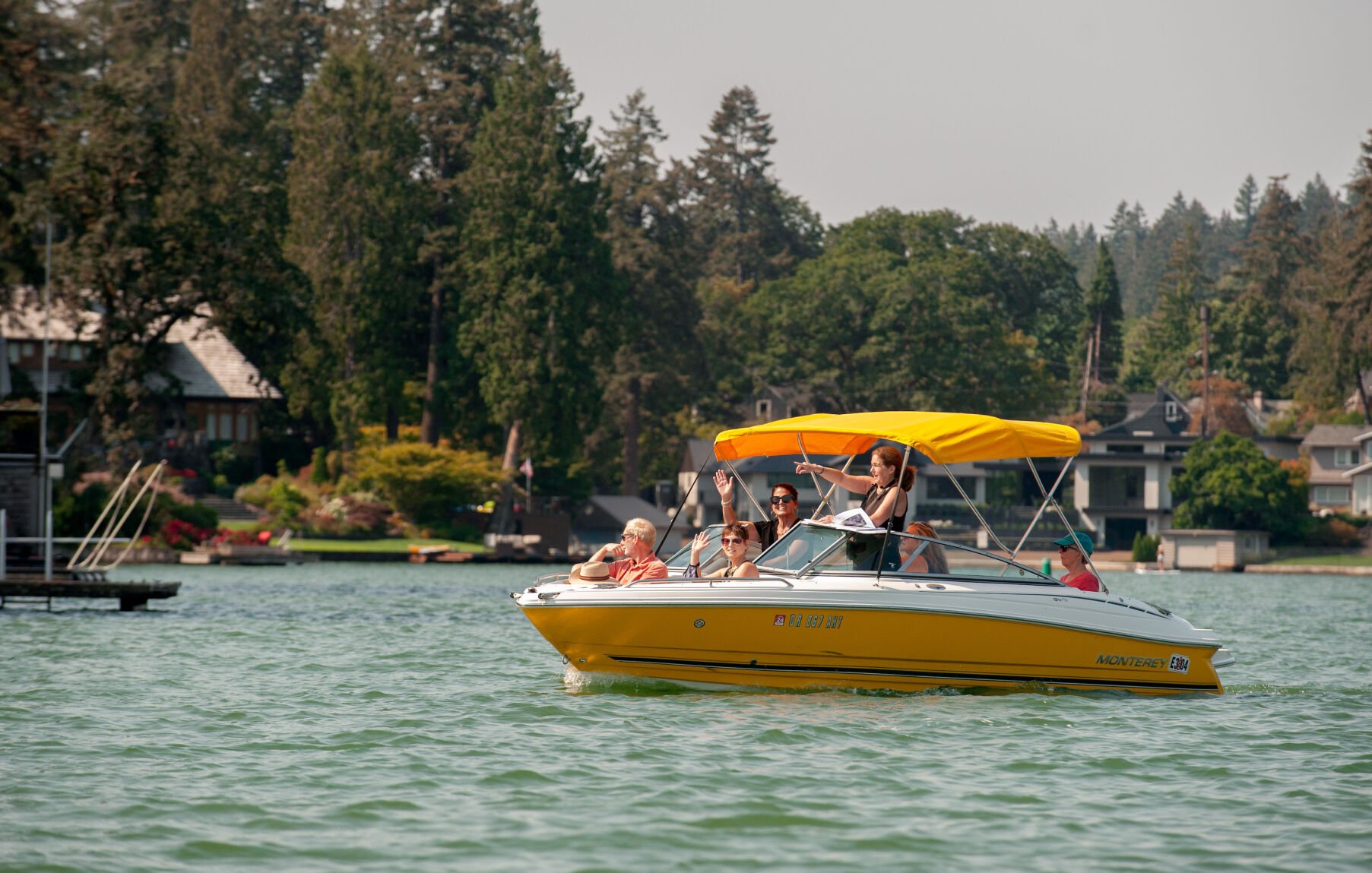State lawmakers bailed on a constitutional climate amendment. Advocates will take it to voters
Published 6:25 am Monday, July 21, 2025

- State Rep. Mark Gamba, D-Milwuakie (right), joins activists from the Oregon Coalition for an Environmental Rights Amendment at a rally in Salem March 26, 2025, after a public hearing on Senate Joint Resolution 28, which would have enshrined the right to a healthy environment in the Oregon Constitution. (Photo by Julia Shumway/Oregon Capital Chronicle)
Environmentalists recently filed a petition to get Oregon voters to guarantee a healthy climate in the state constitution
So many Oregonians supported a constitutional amendment to guarantee the right to a healthy and safe climate that the Legislature had to open a second hearing room just to accommodate all of the people who came to speak in support of it at its only legislative hearing this spring.
Mel Martin, an organizer with the Oregon Coalition for an Environmental Rights Amendment who worked with lawmakers on Senate Joint Resolution 28, was in one of the hearing rooms that day.
“The excitement around it led us to believe that it had legs and it was going forward,” she said.
Trending
It would have referred a ballot measure to Oregon voters in November 2026 to amend the state constitution, but it died without a vote in the Senate committee that heard it.
Martin and other organizers said they still don’t have a clear reason why.
In the wake of the bill’s death, advocates are instead petitioning to bring it straight to Oregon voters themselves.
“The people have the ability to amend their own state constitution,” Martin said. “It does seem like the answer is not to look to the political realm.”
At least one lawmaker on the committee that killed the bill, and a chief sponsor of the bill, described its death as Senate leadership’s fear of failure when it came to Oregonians voting to pass the climate amendment at the ballot box.
“The big concern hasn’t been about the policy so much on the leadership level, it’s the record of ballot measures like that losing,” state Sen. Jeff Golden, D-Ashland, told the Capital Chronicle in June.
Trending
Golden said business industry groups have been successful in the past at getting citizen measures overturned with spendy ad campaigns, and that industry groups would frame a “yes” vote on a potential constitutional climate amendment as one that would be anti-business and bad for the state’s economy. If voters internalized the message, and voted not to amend the constitution to protect the climate for future generations, “there’s a concern that that would give fuel to an argument over time that Oregonians don’t really care about environmental rights,” Golden said.
Oregon Senate President Rob Wagner, D-Lake Oswego, was “unavailable to respond,” according to spokesperson Connor Radnovich. Senate Majority Leader Kayse Jama, D-Portland, head of the Senate Rules Committee where the bill died, is unavailable and out of town this week, spokesperson Elizabeth Cronen said.
The petition
Without legislative support, members of the environmental rights amendment coalition filed an initiative petition with the Oregon Secretary of State’s Office on May 23 that would ask voters to amend the state constitution so that it would guarantee “all people, including children and future generations, have the inherent fundamental right to a clean, safe, and healthy environment, including but not limited to clean air, clean water, thriving ecosystems, and a stable climate system.”
It would also constitutionally clarify that “all of Oregon’s public natural resources are the common property of all the people, including generations yet to come.”
If it passed, it would make Oregon one of four states to make such a promise to future generations in its guiding legal document, and would allow Oregonians to sue the state government and its agencies if it reneges on that promise.
The comment period on the draft ballot language closed on Tuesday and final language will need to be approved by the Oregon Attorney General’s Office. Then, supporters will need to collect more than 150,000 signatures from Oregon voters by July of next year to get it on ballots for the November 2026 election.
Among those named as petitioners on the initiative is Miko Vergun, a 22-year-old plaintiff in the landmark youth climate case Juliana v. United States, filed a decade ago in U.S. District Court in Eugene against the federal government by 11 young Oregonians and 10 peers from several states.
The case, which attempted to hold the U.S. government accountable for accelerating global climate change through lawmakers’ policies and fossil fuel subsidies, never got a trial. It recently hit a dead end after the Supreme Court declined a petition from the plaintiffs to throw out a lower court’s decision to dismiss the case.
Opposition
Martin said besides collecting signatures in the months ahead, they’re also preparing for legal battles over ballot language given the opposition to the bill from the trade group Oregon Business and Industry.
The group was opposed to Senate Joint Resolution 28 back in March. Its lobbyist, Sharla Moffett, was among the handful of participants at the public hearing that were opposed to the bill.
“The terms ‘clean air,’ ‘clean water,’ ‘thriving ecosystems’ and ‘a stable climate’ could be highly subjective,” Moffett said.
It’s a similar argument the group is making now in its opposition to the ballot measure.
Lawyer Jill Gibson, representing Oregon Business and Industry, submitted comments to the Secretary of State’s Office opposing the draft ballot language and the amendment last month.
“The Initiative expressly states that these fundamental rights include the right to clean air, clean water, thriving ecosystems and a stable climate system,” she wrote. “It is unclear what would be considered clean enough, thriving enough, or stable enough to meet the requirements of IP 45 (Initiative Petition 45).”
Martin said advocates behind the ballot initiative are mobilizing to get more volunteers trained to talk with Oregonians about the potential amendment, to understand what it would and would not change, and to gather signatures for the ballot referral.
“There’s an infrastructure aspect to the operation itself for petitioning and also the communication method, be it signage, other coverage, the whole nine yards. So the campaign itself is growing,” she said.
Golden said if history, even recent history, serves as an example, the industry groups will also put a lot of momentum behind their opposition campaign, too.
Senate leaders let the measure die in part, he said, because there were “real concerns that this coalition would be completely outgunned by industry and folks who don’t want an environmental rights amendment in the constitution.”
Martin said she didn’t want to share too much strategy in light of that.
“I don’t want to, I guess, show all of my cards, but we do have a plan,” she said.








